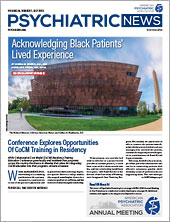As psychedelic substances continue to march toward regulatory approval for therapeutic use, clinicians need to develop clear and strong standards of informed consent. This was one of the key messages of an APA Annual Meeting session on the ethics of psychedelic therapy.
“Psychedelics can induce a fantastical experience that is so different from traditional medicine that some people have said the normal rules shouldn’t apply,” said Sandeep Nayak, M.D., an assistant professor of psychiatry at Johns Hopkins University and a member of the Hopkins Center for Psychedelic & Consciousness Research. “No, they absolutely should apply.”
Given the unique properties of psychedelic substances, many rules should be even stronger, noted Will Smith, M.D., Ph.D., who is a psychiatry fellow at the University of Pennsylvania Perelman School of Medicine and studies biomedical ethics. He argued that there should be an enhanced patient consent process regarding these drugs.
Smith noted that for standard psychotropic medications, such as selective serotonin reuptake inhibitors (SSRIs), informed consent discussions walk patients through the common risks of treatment—the information that the average person would care about. In the case of SSRIs, for example, discussions would touch on gastrointestinal problems, sexual dysfunction, and serotonin syndrome.
With psychedelic substances, however, many of the effects are ineffable; that is, they can’t be described until the person experiences them. Nonetheless, patients need to be made aware, as part of the consent process, that they could experience a range of reactions to psychedelics.
As an example, Smith noted that many people who have used psychedelics describe the process as a spiritual experience, which for some may be a good thing. For some people, however, such a shift can result in feelings of discomfort, particularly if such feelings are unexpected, he said. Smith also advised that clinicians should always temper expectations about the psychedelic process. “Even if patients think they know what they are getting into, tell them it will probably be different.”
After discussing the potential risks of a good “trip” with patients, clinicians also need to stress the rare possibility of the bad “trip,” Smith noted. Though post-psychedelic anxiety is usually transient, Smith cited a
survey of recreational psychedelic users in which about 40% said a bad trip was one of the most challenging experiences of their lives. Other uncommon but important risks are emergent psychosis and re-exposure to old traumas.
Finally, Nayak discussed the contentious issue of touching a patient during psychedelic-assisted therapy. Although a patient may exhibit significant trauma, fear, and/or anxiety when using psychedelics, he cautioned that “there are very strong reasons why touching is not a part of traditional psychiatric therapy.”
He added that there may be situations during which a touch can help patients, but Nayak said it’s important to have a consent discussion beforehand to provide clear standards.
“Tell patients you may grab their hand or gently touch their shoulder, but that it will absolutely not go beyond that,” he said. “Therapeutic touching is a boundary crossing; we need to ensure that it doesn’t turn into a boundary violation.” ■

